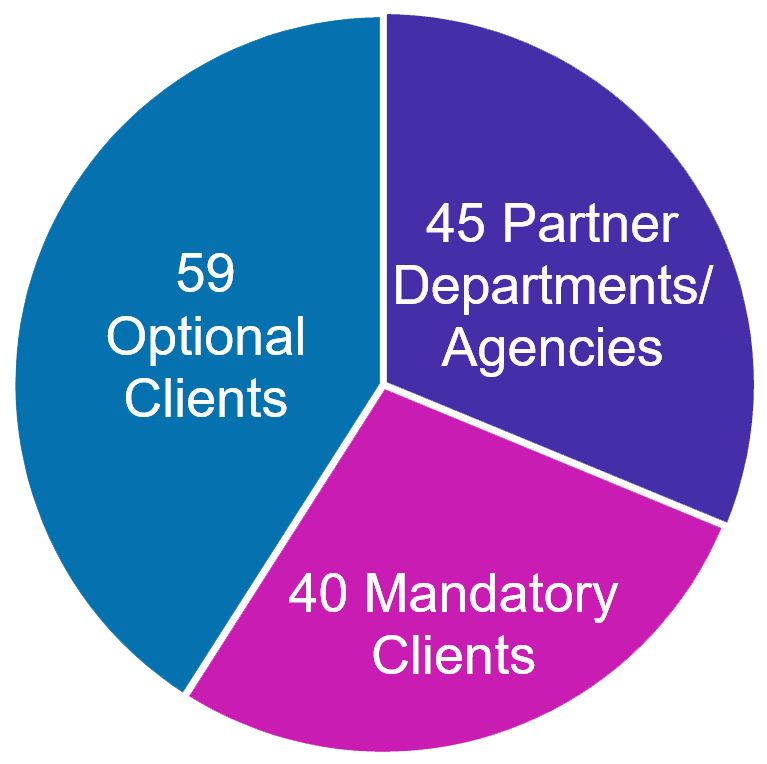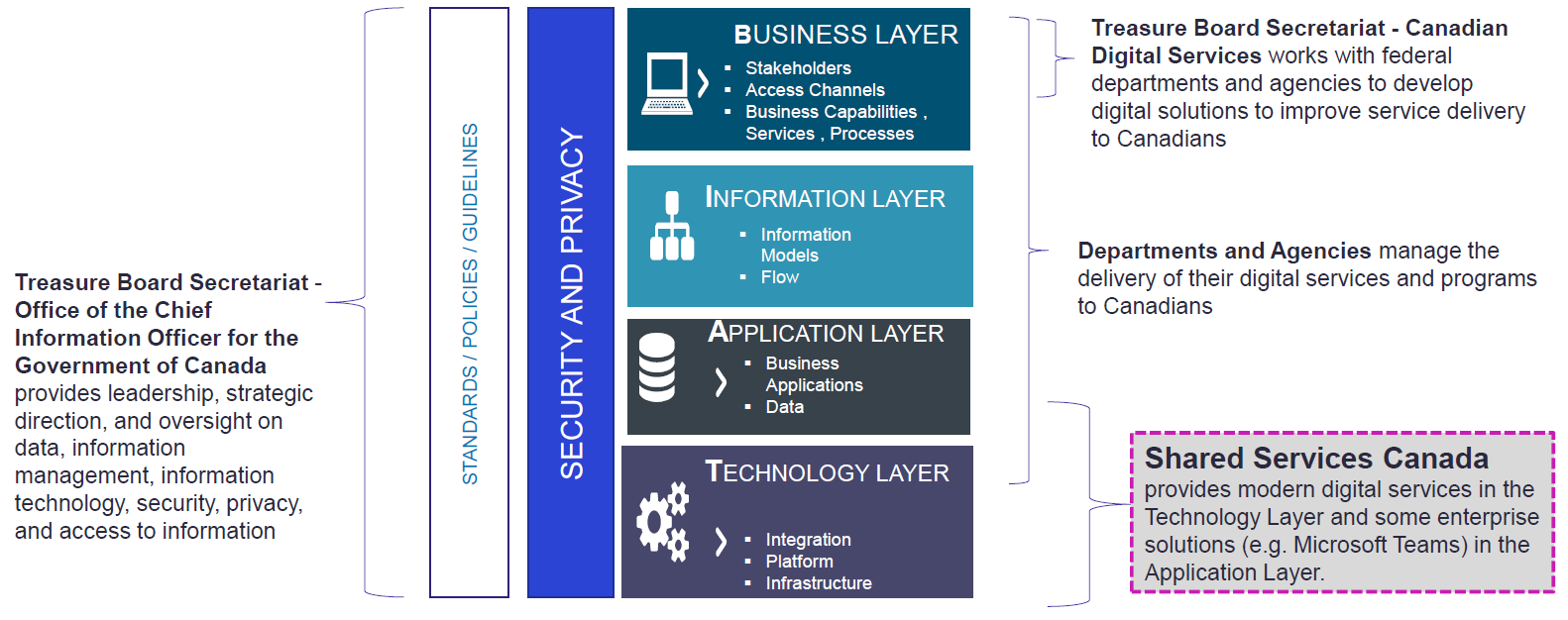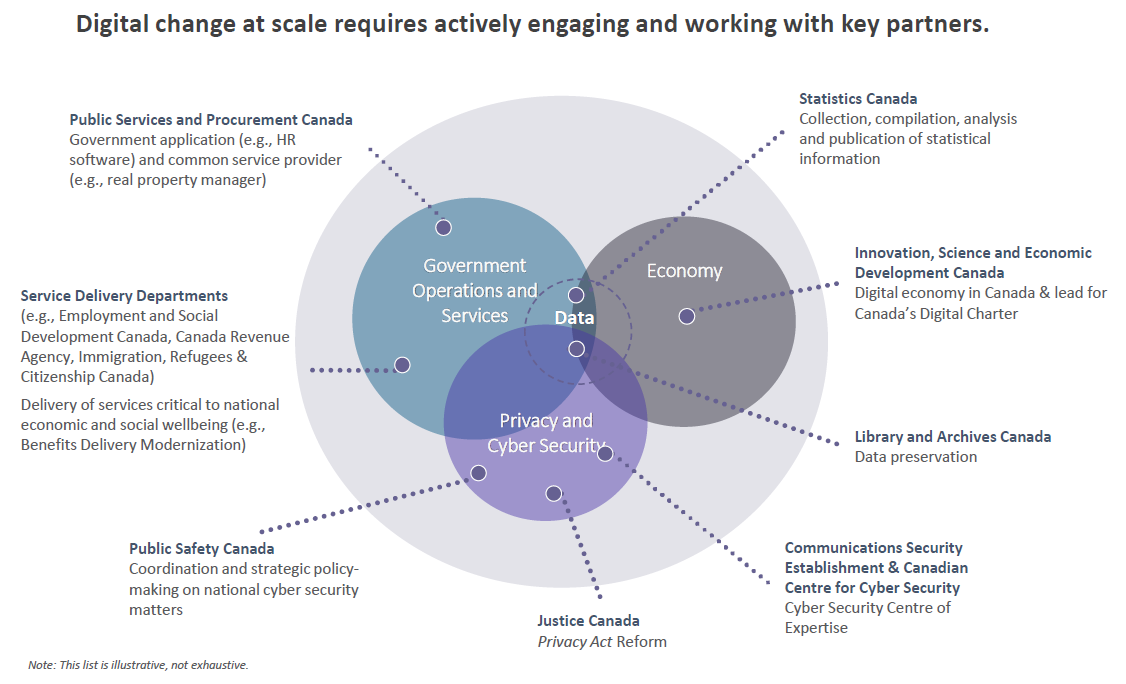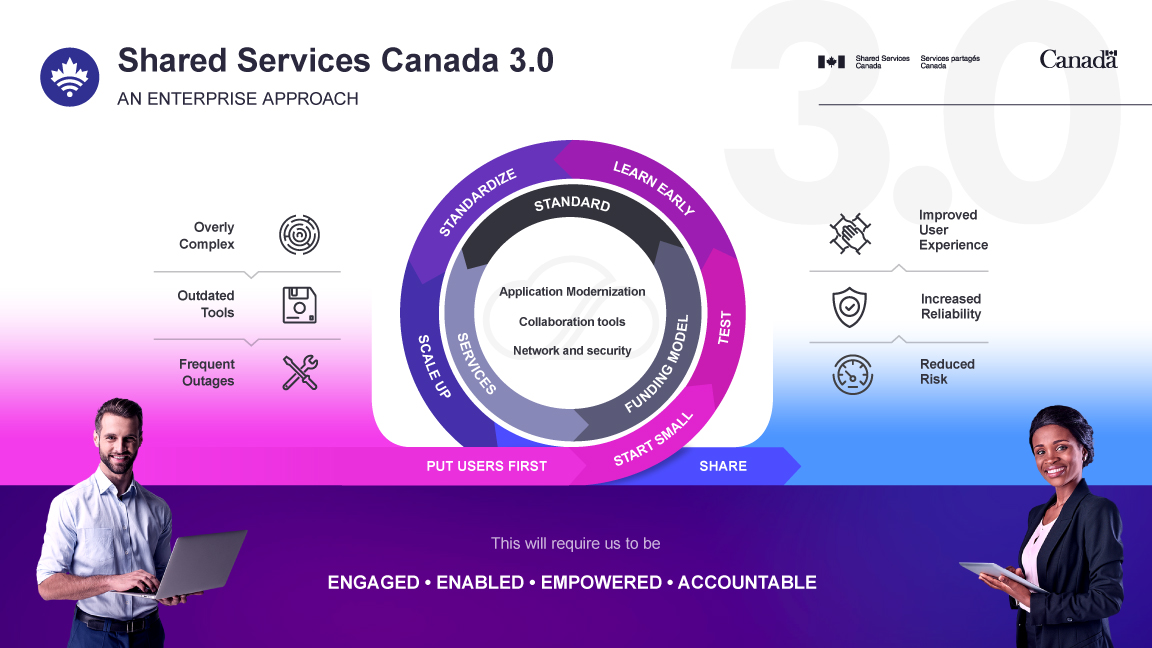Book One – Shared Services Canada Ministerial Transition 2021
Table of contents
- 1. Shared Services Canada 101
- Purpose
- Shared Services Canada at a Glance
- Shared Services Canada by the Numbers
- Digital Landscape
- Applications and Technology Layer - Expenditures Have been Increasing
- The Government of Canada has a complex portfolio of information technology systems and networks
- Shared Services Canada 3.0 Need for an Enterprise Approach
- Regional Distribution
- Organizational Chart
- Shared Services Canada Fun Facts
- Annexes
- Senior Leaders - Bios
- 2. Shared Services Canada 3.0
1. Shared Services Canada 101
Purpose
The purpose of this departmental overview presentation is to:
- Describe Shared Services Canada and the role of the Minister responsible for Shared Services Canada.
- Outline the department’s priorities, structure, and regional distribution.
Shared Services Canada at a Glance
Shared Services Canada has a mandate to modernize and consolidate the federal government’s information technology infrastructure, including email, data centres, network and end‐user devices.
Shared Services Canada provides services to 144 Organizations

Text description – Clients and partners
- 59 Optional Clients
- 45 Partner Departments/ Agencies
- 40 Mandatory Clients
Services
Shared Services Canada provides a full range of shared information management and information technology services to 45 mandated partner departments/agencies (including Shared Services Canada itself), and a subset of those services to all other customer Government of Canada departments and agencies
(see annex for specific organizations)
Cyber Security
Shared Services Canada supports information management and information technology security in partnership with Communications Security Establishment Canada, including the Canadian Centre for Cyber Security, and other partners.
Shared Services Canada supports a disparate portfolio and is working to reduce/consolidate the number of systems
50 Networks
21 Email Systems
500 + Data Centres
12, 000 Government of Canada Applications
Shared Services Canada by the Numbers
Shared Services Canada is committed to improving information technology service delivery and management and is constantly evolving its service management practices and processes across the organization, with the goal of delivering service excellence to its customers
| Total Expenditures (and trend has been growing) | $2.7 billion |
|---|---|
| Revenues from other departments/agencies for services | $733 million |
| Appropriated | $2 billion Appropriated |
| Tangible Capital Assets | $1.2 billion |
| Source: Departmental Results Report 2019-20 - Canada.ca | |
| Data Centres | $590 million |
|---|---|
| Telecommunications | $625 million |
| Cyber and Information Technology Security | $143 million |
| Customer Relationships and Service Management | $234 million |
| Internal Services | $244 billion |
| Email and Workplace Technologies | $137 million |
| Source: Departmental Results Report 2019-20 - Canada.ca | |
| Full Time Equivalents | 8,166 |
|---|---|
| Shared Services Canada-led project costs | $1.4 billion |
| Tangible Capital Assets | $1.2 billion |
| Formal business requests | 3,174 |
| Source: Government of Canada Enterprise Dashboard (May 2021) Budget of 2021-22 Main Estimates Full Time Equivalents as of March 31, 2021 | |
Digital Landscape
Key Federal Departments
 Click to enlarge
Click to enlarge
Image description – Key Federal Departments
The Government’s Digital Landscape involves key organizations playing roles in four separate layers. These are the business layer, information layer, application layer and technology layer (BIAT). The Treasury Board Secretariat (TBS) Office of the Chief Information Officer (OCIO) provides leadership, strategic direction and oversight on data, information management, information technology, security, privacy and access to information across the layers.
The business layer contains stakeholders, access channels, business capabilities, services and processes.
The information layer contains information models and flow.
The application layer contains business applications and data.
The technology layer contains integration, platform and infrastructure.
In the business layer, TBS and the Canadian Digital Services work with departments and agencies to improve service and program delivery to Canadians., and the departments and agencies in question who manage and deliver the services and program to Canadians.
The role of departments and agencies who manage the delivery of their digital services and programs to Canadians spans BIAT.
Shared Services Canada’s role focuses on the application and technology layers given its mandate to provide modern digital services and some enterprise solutions to departments and agencies.
Other Federal Partners
 Click to enlarge
Click to enlarge
Image description – Other Federal Partners
This Venn diagram shows the overlapping aspects among the federal organizations actively engaged in digital change at scale. The four circles in the diagram are (1) Government Operation and Services, (2) Privacy and Cyber Security, (3) Economy and (4) Data.
Government Operations and Services includes Public Services and Procurement Canada and the other service delivery departments (e.g. Employment and Social Development Canada, Canada Revenue Agency, and Immigration, Refugees and Citizenship Canada). Their work involves government applications and delivering critical national economic and social well-being services.
Privacy and Cyber Security includes Public Safety Canada, Justice Canada, the Communications Security Establishment (CSE) and the Canadian Centre for Cyber Security. They coordinate and make strategic policy on national cyber security matters (Public Safety), Privacy Act reform (Justice Canada), and cyber expertise (CSE and Cyber Centre).
Economy includes Innovation, Science and Economic Development Canada, which leads Canada’s digital economy and charter.
Data includes Statistics Canada and Library and Archives Canada who collect, compile, analyze and publish statistical information and preserve data.
Applications and Technology Layer - Expenditures Have been Increasing
Now, more than ever, Canadians want to receive modern digital services from the Government of Canada that are fast, reliable and secure. As a result, the demand for faster networks with greater available bandwidth and hosting solutions that can support heavier work loads has significantly increased.
While the unit cost has decreased over time, and with Shared Services Canada having mitigated increasing expenditures through the economies of scale that have been achieved with the consolidation and modernization of the Government of Canada’s information technology infrastructure, overall costs continue to increase to support this increase in demand.
Shared Services Canada is the provider of information technology infrastructure services (technology layer), which represent approximately 40% of annual government expenditures
| Year | Partners | Shared Services Canada |
|---|---|---|
| 2013-14 | $3.2 | $1.9 |
| 2014-15 | $3.3 | $1.9 |
| 2015-16 | $3.4 | $1.9 |
| 2016-17 | $3.7 | $2.2 |
| 2017-18 | $4.0 | $2.3 |
| 2018-19 | $4.4 | $2.4 |
| 2019-20 | $4.9 | $2.6 |
| Information Technology Applications | $2,639 |
|---|---|
| Production and Operations Computing | $1,202 |
| Telecom and Networks | $1,361 |
| Information Technology Security | $420 |
| Information Technology Program Management | $722 |
| Distributed Computing | $1,188 |
|
Source: 2019-20 Department Information Technology Expenditure Reports 44 partner departments + 3
client departments (Canadian Institutes of Health Research, Natural Sciences and Engineering
Research Council, Social Sciences and Humanities Research Council).
Note: Shared Services Canada expenditures include Shared Service Canada’s Vote Net Revenue (Information Technology Services Provided by Shared Services Canada to Other Departments). |
|
The Government of Canada has a complex portfolio ofinformation technology systems and networks
Decades of under-investments have resulted in the accrual of significant “technical debt” as information technology infrastructure ages faster than the pace of repairs or replacements.
Not only is it inherently costly to maintain, older infrastructure often performs poorly and can be more prone to service interruptions.
- Historically, federal institutions developed and implemented their programs and services and supporting operations independently of each other.
- This has resulted in siloed operations, data and technology, with each department developing its own approaches.
- In 2011, Shared Services Canada was created to integrate the Government of Canada information technology infrastructure and some of the information technology support services (email, telecommunications). It took over an aging patchwork of information technology systems and networks that lacked interoperability.
- In 2019, the Government of Canada Chief Information Officer-led Enterprise Governance and Planning, along with policy changes, supported significant investments to modernize and enhance the Government’s digital services.
- Shared Services Canada has made progress repairing and replacing critical hardware infrastructure, including decommissioning costly legacy data centres, implementing modern cross-government information technology solutions.
- Progress to support departments to modernize their applications has been slower.
Shared Services Canada 3.0 Need for an Enterprise Approach
Shared Services Canada 3.0 outlines a strategy that focuses on the Government of Canada in its entirety to improve service delivery and the user experience by consolidating, modernizing and standardizing digital services and infrastructure
While there is no single “one-size-fits-all” approach for Government of Canada digital services, custom and unique solutions lead to increased costs and sub-optimal service deliver.
1. Network and security
Transition away from single departmental networks to modern enterprise networks that are secure, reliable and accessible.
2. Collaboration tools
Deliver modern digital solutions that are accessible by design, enhance productivity and allow collaboration across departments.
3. Application modernization
Identify applications most at risk, with the biggest potential impact on services to determine solutions that are modern and reliable.
4. Enabling the enterprise
Establishment of standards, revised services and funding model will increase efficiency and effectiveness.
Shared Services Canada has enabling procurement authorities to procure all goods and services related to delivery of the shared services that it is mandated to provide, while Public Service and Procurement Canada retains the authority to provide procurement-as-a-service to other departments.
Moving to an enterprise approach will leverage economies of scale, provide more secure and reliable services, faster turnarounds, enhanced collaboration, and reduce risk – ultimately, better serving Canadians.
Regional Distribution
Shared Services Canada devotes considerable resources to working with partner departments and agencies around Canada and has employees, offices and data centres distributed across the country.
Data from April 1, 2021| Region | Full-time equivalents |
|---|---|
| Belleville | 0 |
| Calgary | 34 |
| Canadian Forces Base Borden | 54 |
| Charlottetown | 72 |
| Edmonton | 104 |
| Fredericton | 0 |
| Halifax/Dartmouth | 137 |
| Kingston | 1 |
| Matane/Rimouski | 15 |
| Moncton | 187 |
| Montreal/Dorval | 385 |
| Ottawa/Gatineau | 6343 |
| Petawawa | 18 |
| Quebec City | 78 |
| Regina | 23 |
| Saskatoon | 11 |
| St John’s | 5 |
| Toronto | 128 |
| Vancouver | 145 |
| Victoria | 41 |
| Winnipeg | 85 |
| Yellowknife | 2 |
| Total | 8,166 |
Organizational Chart
President
Paul Glover
Executive Vice-President
Sony Perron
- Senior Assistant Deputy Minister, Operations Management
Greg McKay - Assistant Deputy Minister, Networks and Security Services
Patrice Nadeau - Assistant Deputy Minister, Digital Services
Mélanie Scott - Assistant Deputy Minister, Data Centre Services
Jacquie Manchevsky - Senior Assistant Deputy Minister, Project Management and Delivery
Louis-Paul Normand - Assistant Deputy Minister, Next Generation HR and Pay
Shereen Benzvy Miller - Senior Assistant Deputy Minister, Client Service Delivery and Management – Citizen and Business
Ken Canam - Assistant Deputy Minister, Client Service Delivery and Management - Citizen and Business
Kristina Casey - Assistant Deputy Minister, Client Service Delivery and Management - National Defence and
Policing
Brendan Dunn - Assistant Deputy Minister, Client Service Delivery and Management - Digital Government and Science
José Gendron - Assistant Deputy Minister, Enterprise Information Technology Procurement and Corporate
Services
Stéphane Cousineau Senior - Assistant Deputy Minister, Strategy and Engagement
Paule Labbé - Assistant Deputy Minister and Deputy Chief Technology Officer
Shannon Archibald - Chief Technology Officer
Matt Davies - Assistant Deputy Minister and Chief Financial Officer
Samantha Hazen - Chief Audit and Evaluation Executive
Begonia Lojk - Chief Information Officer
Marie-Claude Renaud - Ombuds
Alexandre St-Jean
Shared Services Canada Fun Facts
Supercomputing
Shared Services Canada supports Environment and Climate Change Canada High Performance Computing capacity to improve the accuracy and timeliness of weather forecasting services.
Satellite Communication
Shared Services Canada supports the Department of National Defence’s ability to communicate with ships around the world via satellite network.
Canadaarm2
Shared Services Canada supported the Canadian Space Agency to ensure the success of robotics operations on board the International Space Station.
Annexes
Annex: Shared Services Canada Act
The Shared Services Canada Act, and Orders-in-Council, stipulates how Shared Services Canada supports the Government of Canada in its delivery of the many programs and services provided by the numerous organizations to Canadians.
Shared Services Canada Act
- The Act establishes Shared Services Canada’s role to provide centralized administrative shared services to the Government of Canada.
- The Governor in Council may name the Minister responsible for Shared Services Canada, set out the specific mandated services and identify the departments that Shared Services Canada may and must serve through orders‐in‐council.
- The Act gives the Minister responsible for Shared Services Canada enabling procurement authorities.
Orders-in-Council
- Orders-in-Council outline Shared Services Canada’s core mandate with regards to the provision of services
related to:
- email;
- data centres;
- networks; and,
- services related to end-user information technologies (also known as work place technology devices) with the exception of end-user support services.
- As part of these four mandate areas, Shared Services Canada also plays a significant cyber security role, in close collaboration with other security departments and agencies.
Annex: Shared Services Canada Partners
The following partners are mandatory recipients of Shared Services Canada email, networks, and data centre services, along with Shared Services Canada end-user information technology and workplace technology device services.
- Agriculture and Agri-Food Canada
- Atlantic Canada Opportunities Agency
- Canada Border Services Agency
- Canada Economic Development for Quebec Regions
- Canada Revenue Agency
- Canada School of Public Service
- Canadian Food Inspection Agency
- Canadian Heritage
- Canadian Northern Economic Development Agency
- Canadian Nuclear Safety Commission
- Canadian Space Agency
- Correctional Service of Canada
- Crown-Indigenous Relations and Northern Affairs Canada
- Department of Finance Canada
- Department of Justice Canada
- Employment and Social Development Canada
- Environment and Climate Change Canada
- Federal Economic Development Agency for Southern Ontario
- Financial Transactions and Reports Analysis Centre of Canada
- Fisheries and Oceans Canada
- Global Affairs Canada
- Health Canada
- Immigration and Refugee Board of Canada
- Immigration, Refugees and Citizenship Canada
- Indigenous Services Canada
- Infrastructure Canada
- Innovation, Science and Economic Development Canada
- Library and Archives Canada
- National Defence
- National Research Council
- Natural Resources Canada
- Pacific Economic Development Canada
- Parks Canada
- Prairies Economic Development Canada
- Privy Council Office
- Public Health Agency of Canada
- Public Safety Canada
- Public Service Commission
- Public Services and Procurement Canada
- Royal Canadian Mounted Police
- Shared Services Canada
- Statistics Canada
- Transport Canada
- Treasury Board of Canada Secretariat
- Veterans Affairs Canada
Annex: Shared Services Canada Mandatory Clients
The following Government of Canada clients are mandatory recipients of a subset of Shared Services Canada email, networks, and data centre services, and are mandatory recipients of Shared Services Canada end-user information technology and workplace technology device services.
- Administrative Tribunals Support Service of Canada
- Canada Employment Insurance Commission
- Canada Energy Regulator
- Canadian Centre for Occupational Health and Safety
- Canadian Grain Commission
- Canadian Human Rights Commission
- Canadian Institutes of Health Research
- Canadian Intergovernmental Conference Secretariat
- Canadian Radio-television and Telecommunications Commission
- Canadian Security Intelligence Service
- Canadian Transportation Accident Investigation and Safety Board
- Canadian Transportation Agency
- Civilian Review and Complaints Commission for the RCMP
- Communications Security Establishment
- Copyright Board
- Federal Judicial Affairs Canada
- Financial Consumer Agency of Canada
- Impact Assessment Agency of Canada
- Invest in Canada Hub
- Military Grievances External Review Committee
- Military Police Complaints Commission of Canada
- National Film Board of Canada
- Natural Sciences and Engineering Research Council of Canada
- National Battlefields Commission
- National Farm Products Council
- Northern Pipeline Agency Canada
- Secretariat of the National Security and Intelligence Committee of Parliamentarians
- Office of the Communications Security Establishment Commissioner
- Office of the Correctional Investigator
- Office of the Secretary to the Governor General
- Office of the Superintendent of Financial Institutions
- Parole Board of Canada
- Patented Medicine Prices Review Board
- Polar Knowledge Canada
- Public Prosecution Service of Canada
- Royal Canadian Mounted Police External Review Committee
- Security Intelligence Review Committee
- Social Sciences and Humanities Research Council of Canada
- Veterans Review and Appeal Board
- Women and Gender Equality Canada
Annex: Shared Services Canada Optional Clients
The following Government of Canada clients are optional recipients of Shared Services Canada services.
- Atlantic Pilotage Authority
- Atomic Energy of Canada Limited
- Bank of Canada
- Business Development Bank of Canada
- Canada Council for the Arts
- Canada Deposit Insurance Corporation
- Canada Development Investment Corporation
- Canada Infrastructure Bank
- Canada Lands Company Limited
- Canada Mortgage and Housing Corporation
- Canada Pension Plan Investment Board
- Canadian Air Transport Security Authority
- Canadian Broadcasting Corporation
- Canadian Commercial Corporation
- Canadian Dairy Commission
- Canadian Museum for Human Rights
- Canadian Museum of History
- Canadian Museum of Immigration
- Canadian Museum of Nature
- Canada Post Corporation
- Canadian Race Relations Foundation
- Conflict of Interest and Ethics Commissioner
- Courts Administration Service
- Defence Construction Limited
- Destination Canada
- Export Development Canada
- Federal Bridge Corporation Limited
- Farm Credit Canada
- Freshwater Fish Marketing Corporation
- Great Lakes Pilotage Authority
- House of Commons
- International Development Research Centre
- Laurentian Pilotage Authority
- Library of Parliament
- Marine Atlantic Inc.
- National Arts Centre
- National Capital Commission
- National Gallery of Canada
- National Museum of Science and Technology
- Office of the Auditor General of Canada
- Office of The Chief Electoral Officer
- Office of the Commissioner of Lobbying
- Office of the Commissioner of Official Languages
- Offices of the Information and Privacy Commissioners of Canada
- Public-Private Partnerships Canada Inc.
- Pacific Pilotage Authority
- Parliamentary Protective Service
- Public Sector Integrity Commissioner
- Public Sector Pension Investment Board
- Registrar of the Supreme Court Of Canada
- Royal Canadian Mint
- Ridley Terminals Inc.
- Senate Ethics Officer
- Senate of Canada
- Standards Council of Canada
- Telefilm Canada
- The Jacques-Cartier and Champlain Bridges Inc.
- VIA Rail Canada
- Windsor-Detroit Bridge Authority
Senior Leaders - Bios
Paul Glover - President

Paul Glover was appointed to the role of President of Shared Services Canada in January 2019.
He also served as the President of the Canadian Food Inspection Agency from October 2016 to January 2019.
Paul was the Associate Deputy Minister of Health Canada from July 2013 to October 2016.
Prior to his appointment as Associate Deputy Minister of Health Canada, he was Assistant Deputy Minister of both the Health Products and Food Branch (January 2011 to July 2013), and the Healthy Environments and Consumer Safety Branch (September 2008 to January 2011). Prior to that, he worked on a wide range of social policy issues in the Privy Council Office’s Operations Secretariat.
Paul began his career at Health Canada in 1986, in the informatics area. He then moved on to health systems management assuming jobs with progressively more responsibility.
He eventually accepted a position of Director General to a number of business units, including Indigenous and Inuit health programs, the Non-Insured Health Benefits Program, and the Safe Environments Program.
Over the years Paul has served on numerous governing bodies, including the Board of Directors of the Queensway Carleton Hospital, the Mental Health Commission of Canada, Canada Health Infoway, the Advisory Board for the Canadian Institutes of Health Research, and the Queen’s University Board of Directors for the Centre for Water and the Environment. He has been a member of the National Academies of Science in the United States and the International Joint Commission.
Paul served as the Assistant Deputy Minister Champion for the Community of Federal Regulators and currently serves as the Deputy Minister Champion for Brock University.
Paul earned his Master’s in Business Administration from Queen’s University.
Sony Perron – Executive Vice-President

Sony Perron was appointed to the role of Executive Vice-President of Shared Services Canada on September 28, 2020.
Prior to arriving at Shared Services Canada, Sony held the position of Associate Deputy Minister at Indigenous Services Canada. Sony also served as Senior Assistant Deputy Minister of the First Nations and Inuit Health Branch at Health Canada from January 2014 to December 2017, and Assistant Deputy Minister, Corporate Services Branch between 2012 and 2013.
Previously, Sony occupied a number of executive functions in Health Canada including the positions of Director General, Transformation; Director General, Non-Insured Health Benefits; and Executive Director, Operational Services and Systems.
Sony started his Public Service career at Canada Economic Development in 1997, and worked at the Treasury Board Secretariat and Human Resources Development Canada prior to joining Health Canada.
Sony served as the National Chair of the 2020 Government of Canada Workplace Charitable Campaign.
Sony holds a Master’s in Public Administration and a Bachelor’s Degree in Urban Planning. He is married and the father of three children.
Greg McKay – Senior Assistant Deputy Minister

Greg McKay is the Senior Assistant Deputy Minister of the Operations Management branch at Shared Services Canada.
He joined Shared Services Canada in 2016. Greg has over 35 years of experience in information technology services, with a particular focus on client delivery management and ensuring accountability across large, complex delivery organizations.
The substantive portion of Greg’s career took place with Electronic Data Systems where he held positions of increasing responsibility across the organization culminating in the role of Vice- President, Service Delivery. His most recent roles were leading the Information Technology Outsourcing Division of ATCO I-Tek, a shared service to ATCO’s subsidiaries, and as General Manager, Service Delivery.
Greg holds a Master’s degree in Business Administration from Queen’s University.
Patrice Nadeau – Assistant Deputy Minister

Patrice Nadeau is the Assistant Deputy Minister responsible for the Networks and Security Services Branch at Shared Services Canada.
Prior to assuming his current role, he was Director General of the Data Networks directorate at Shared Services Canada. He joined Shared Services Canada when it was created in 2011.
Previous to that, he worked at Public Works and Government Services Canada from 1996 to 2011. During this time, he held various information technology management positions, including Account Manager for the Government Telecommunications and Informatics Services and the Delivery Executive of the Telecommunications and Information Technology Security Service Delivery Division.
Patrice began his career in the private sector with Matrox in Dorval, Quebec.
Patrice holds a Bachelor’s degree in Electrical Engineering from l'École de technologie supérieure de Montréal.
Mélanie Scott – Assistant Deputy Minister

Mélanie Scott is the Assistant Deputy Minister responsible for the Digital Services Branch at Shared Services Canada.
In her current role, she oversees digital services that improve workplace communication, collaboration and mobility. She provides workplace tools and technology at the enterprise level, while delivering improved value for Canadians.
Melanie has provided leadership in the areas of information technology security, data management business relationships and partnerships, and information technology operations in various director and director- general roles at the Communications Security Establishment Canada, Library and Archives Canada as well as Shared Services Canada.
Mélanie was the recipient of the Governor General’s Academic Medal of Canada for the University of Sherbrooke, the 2016 Excellence of Service Award from Library and Archives Canada for Excellence in Service Delivery, and the 2016 Shared Services Canada Award of Excellence for Collaboration and Organizational Improvement.
For more than three years, Mélanie was Shared Service Canada’s co-champion for Official Languages and remains passionately committed to creating a bilingual and inclusive work environment for the public service.
Mélanie holds a Bachelor of Computer Science from the University of Sherbrooke and a Master of Business Administration Executive MBA Program from the University of Ottawa. She is currently completing the Certificate in Public Leadership and Governance with the University of Ottawa. Mélanie is the proud mother of three.
Jacquie Manchevsky – Assistant Deputy Minister

Jacquie Manchevsky is the Assistant Deputy Minister of the Data Centre Services Branch at Shared Services Canada.
Prior to assuming her current role, Jacquie served as Assistant Deputy Minister for the Next Generation Human Resources and Pay initiative for the Treasury Board Secretariat where she led extensive employee and stakeholder engagement building on lessons learned from the Phoenix pay system to identify three options for a modern, integrated human resources and pay solution for the Government of Canada.
Jacquie has a significant number of years’ experience in providing operational services to Canadians which have national oversight with regional delivery across Canada. She has held various Director and Director General positions at Employment and Social Development Canada across various programs including Employment Insurance Appeals, Employment Insurance, Canada Pension Plan and Old Age Security Call Centres, the Temporary Foreign Worker Program and Grants and Contributions.
Additionally, in her 25+ year career in the Government of Canada, Jacquie has worked in various roles across departments with increasing areas of responsibility, including, Environment Canada, Privy Council Office, and the Millennium Bureau of Canada. She is highly experienced in leading transformation initiatives, building strategic partnerships and team management.
Louis-Paul Normand – Senior Assistant Deputy Minister

Louis-Paul Normand is the Senior Assistant Deputy Minister of the Project Management and Delivery branch at Shared Services Canada. He joined the Department in October 2016.
From 2013 to 2016, Louis-Paul served as the Associate Vice-President of the Information, Science and Technology branch at the Canada Border Services Agency. He is a seasoned senior executive with a solid track record in transforming large and complex organizations, and has over 30 years in private and public sector organizations.
Prior to joining the Public Service in 2013, Louis- Paul was with IBM leading business development activities in strategic outsourcing for clients in Ontario, Quebec and the Maritimes.
Louis-Paul holds a Master’s degree in Science (Electrical Engineering) from the University of Ottawa and a Bachelor’s degree in Electrical Engineering from the Royal Military College of Canada.
Shereen Benzvy Miller – Assistant Deputy Minister

Shereen Benzvy Miller is the Assistant Deputy Minister of the Next Generation Human Resources and Pay Branch.
She has taken on the leadership of the NextGen Pilot Project Team, which has been established at Shared Services Canada to explore a future human resources and pay solution for the Government of Canada. This solution will be a digital solution that is mobile, accessible and available 24/7, and will be built on the foundation of users’ needs and modern people management processes. Shereen reports directly to Paul Glover, President of Shared Services Canada, and the team will operate as a project separate from Shared Services Canada operations.
This is Shereen’s third position as an Assistant Deputy Minister having been the Assistant Deputy Minister of Small Business, Tourism and Market Place Services at Innovation, Science and Economic Development Canada and the Deputy Chair, Refugee Protection at the Immigration and Refugee Board. Shereen is a senior executive with a strong record of leadership in delivering timely, innovative and effective business and process transformation in the Government of Canada over the past 20 years.
She has expertise in shaping strategic policy, conceptualizing, guiding and directing key programs, and overseeing operations in both service delivery and regulatory bodies. She is the creator and founder of the Build In Canada Innovation Program (Supply push procurement program) and the Innovative Solutions Canada Program (Demand pull procurement program); the Canadian Innovation Centre for Mental Health in the Workplace. She built and launched a new electronic tendering system for the Government of Canada, www.buyandsell.gc.ca. She is highly experienced in process and organizational change, digital transformation, executive team management and strategic partnership building.
Shereen has a Bachelor of Arts from McGill University, a Masters of Arts in Criminology from the University of Pennsylvania, and her Juris Doctorat from Osgoode Hall Law School. She is a long- standing advocate for human rights, diversity and inclusion and a really good baker.
Ken Canam – Senior Assistant Deputy Minister

Ken is the Senior Assistant Deputy Minister of the Client Service Delivery and Management – Citizen and Business Branch.
At the start of the COVID-19 pandemic, Ken assumed responsibility for service delivery specifically for the Canada Revenue Agency and Economic and Social Development Canada. Ken was tasked with ensuring that Shared Services Canada would be successful in meeting the Government of Canada’s delivery of benefit programs as a result of COVID-19.
Ken’s role was to oversee the overall growth of infrastructure (networking, security and computing) for Canada Revenue Agency and Economic and Social Development Canada – in some cases, the infrastructure was increased by almost 900%. Ken and his teams continue to work with Canada Revenue Agency and Economic and Social Development Canada on various return to work initiatives, and more specifically with Economic and Social Development Canada, the advancement of the Benefits Modernization Program.
Ken also assumed the leadership of the client executive teams supporting the Canada Border Services Agency, Immigration, Refugee and Citizenship Canada and the Immigration Refugee Board.
In addition to this role, Ken will support departmental priorities and broader Government of Canada objectives to advance the government’s digital agenda and oversee the transition of his current files as he prepares for retirement.
Before his time in Client Service Delivery and Management, Ken was the Senior Assistant Deputy Minister of Data Centre Services Branch. Prior to this, he served as the Director General responsible for mid- range computing and digital data storage systems.
Before joining Shared Services Canada, Ken held senior management positions in information technology systems, security and project management at the Financial Transactions and Reports Analysis Centre of Canada, the Communications Security Establishment and Canada Revenue Agency.
Ken has more than 31 years of experience serving Canadians and brings to his role a vast information technology and leadership experience from across the federal Public Service.
Ken holds a Bachelor’s degree of Science in Computer Science from the University of New Brunswick.
Kristina Casey – Assistant Deputy Minister

Kristina Casey joined Shared Services Canada in September 2021 as an Assistant Deputy Minister in Client Service Delivery and Management Branch.
Kristina comes to Shared Services Canada from Global Affairs Canada where she served as Chief Information Officer and Director General of the Information Management and Technology Branch since 2018. She led information and technology services to clients at Global Affairs Canada head quarters, as well as at sites across Canada and at Canada’s missions abroad.
Previous to this, at Natural Resources Canada, Kristina was known for her leadership in advancing that department’s information management and information technology transformation, including the implementation of Natural Resources Canada's Federal Science Library that earned a GTEC award. She has more than 15 years of experience in developing, managing and delivering information management and information technology.
Brendan Dunne – Assistant Deputy Minister

Brendan is the Assistant Deputy Minister for the Client Service Delivery and Management – National Defence and Policing Branch.
He is responsible for the effective and efficient delivery of information technology services to the Department of National Defence, the Canadian Armed Forces, the Royal Canadian Mounted Police, and Veterans Affairs Canada. Brendan leads the client executive teams that support these departments in providing information technology services to digitally enable their unique operational and security requirements. Brendan is also responsible for Shared Services Canada’s only dedicated service line, Policing Infrastructure Operations, which provides data centre, network, email, and security services to the Royal Canadian Mounted Police and the wider Canadian policing community.
He has almost 35 years technology and leadership experience within the Government of Canada at the Canada Revenue Agency, Canada Border Services Agency, the Royal Canadian Mounted Police and Shared Services Canada. Since 1995, Brendan has held civilian leadership positions primarily in law enforcement, policing, and public safety domains.
As a senior executive with the Royal Canadian Mounted Police from 2003 to 2011, he was responsible for all national systems and led key horizontal technology initiatives including the 2010 Olympics and G8/G20 Summits.
Brendan graduated from the Executive Development in Policing program at the Canadian Police College in 2009.
Brendan planned and led the transition for the Royal Canadian Mounted Police into Shared Services Canada in 2011. During his first 3 years at SSC, he took on senior leadership roles in the National Security Portfolio, Enterprise Data Centres and, in 2014, became the Director General responsible simultaneously for Government Operations Portfolio and Enterprise Information Technology Service Management organizations.
Brendan became the Chief Technology Officer for the Canada Border Services Agency in 2015 and was responsible for all border operations technology as well as managing both government and industry partners. Key accomplishments include Operation Syrian Refugees in 2015-16 and leading an international Border Five senior advisory group.
Brendan returned to Shared Services Canada in 2018 to lead the Policing Service Delivery Renewal program. As the senior executive accountable for all aspects of Shared Services Canada services to the Royal Canadian Mounted Police and Canadian policing agencies, Brendan was recognized by both the Royal Canadian Mounted Police and the wider policing community as having successfully transformed the relationship.
In 2020, as an Associate Assistant Deputy Minister, Brendan co-led Shared Services Canada’s successful collaborative efforts implementing the Canada Emergency Response Benefits and other benefit programs in response to the pandemic.
Brendan has a Bachelor of Commerce, Honours, with a specialization in Management Information Systems from the University of Ottawa.
José Gendron – Assistant Deputy Minister

José Gendron is the Assistant Deputy Minister of the Client Service Delivery and Management – Digital Government and Science Branch.
He is responsible for the effective and efficient delivery of information technology services offered to 35 of Shared Services Canada’s partner departments, 40 mandatory clients and 65 optional clients. José leads the client executive teams that support these organizations in service delivery and ensures client satisfaction.
Previously, he occupied the position of Acting Associate Assistant Deputy Minister responsible for the Client Executive organization in the Service Delivery and Management branch at Shared Services Canada from 2018 to 2020.
He also served as the Director General responsible for leading service delivery management for various federal government departments under the Service Delivery and Management branch and Strategy branch from 2015 to 2018.
José joined Shared Services Canada in December 2011 serving as the Director General leading the National Security Portfolio under the Operations branch until 2015.
In 2010, José started in the Public Service as Director Defence Information Management Planning. Soon after, he was appointed Acting Director General of Information Management Strategic Planning at the Department of National Defence. Prior to this he had been a member of the Canadian Armed Forces since 1977 where he served in various command positions.
José holds a Bachelor’s of Electrical Engineering from the Royal Military College of Canada and a Master’s Degree in Defence Studies.
Stéphane Cousineau – Senior Assistant Deputy Minister

Stéphane Cousineau was appointed to the role of Senior Assistant Deputy Minister of Enterprise Information Technology Procurement and Corporate Services at Shared Services Canada in May 2018.
Prior to this appointment, he was the Assistant Deputy Minister of Corporate Management Services and Chief Financial Officer of the Financial Transactions and Reports Analysis Centre of Canada.
He has 29 years of experience in the federal government; 19 years of which have been at the executive level. He has served as Director General of the Project Management Bureau as well as Chief Information Officer at Passport Canada, Elections Canada and the Department of Foreign Affairs and International Trade.
Stéphane also contributes to a number of broader Government of Canada initiatives, including mental health and wellness. He was the Co-Champion of the National Public Service Week for 2020-2021, he was the Co-Champion of the Workplace Charitable Campaign at Shared Services Canada for 2019–2020 and he also served as the Co-Chair of the Assistant Deputy Minister Learning Advisory Committee in 2019.
Stéphane teaches project leadership on an annual basis at Queen’s University.
He holds a Master’s Degree in Business Administration from Queen’s University.
Paule Labbé – Assistant Deputy Minister

Paule Labbé joined Shared Services Canada as the Assistant Deputy Minister of the Strategy and Engagement Branch.
Previously she was the Assistant Deputy Minister of Executive and Leadership Development at the Office of the Chief Human Resources Officer for the Government of Canada. In this role, she was responsible for the policy framework governing executive classification, organization and compensation as well as government-wide leadership for the performance and talent management of the 5,400+ executives in the core public administration.
Paule has enjoyed a varied career in the public service, ranging from tax policy and administration at the Department of Finance and the Canada Revenue Agency, to strategic and operational planning, reporting and results at Health Canada.
As an Executive Director at the Treasury Board Secretariat, she transformed the Management Accountability Framework from a qualitative, ratings-based process to a rigorous, data and information driven assessment of Government of Canada management.
She led the Policy Suite Reset initiative that has led to the streamlining of administrative policies governing key corporate functions (e.g. financial, information management / information technology, human resources, etc.) across the federal government. In that role, Paule also provided technical assistance on public management to the governments of Kazakhstan and South Africa.
Paule has a Bachelor of Economics (McGill University) and a Master of Business Administration (University of Ottawa).
Matt Davies – Chief Technology Officer

Matt Davies, Chief Technology Officer for Shared Services Canada, is a well-respected visionary leader and a corporate director who understands the importance of developing business strategies that support growth and innovation objectives while driving digital transformation and managing cybersecurity risk. Strong business acumen coupled with experience is reflected in Matt’s versatility and vision.
Matt has shared his insight and expertise to help educate board members and executives on both digital transformation and cybersecurity risk. He recently shared his perspective for an Institute of Corporate Directors webinar on “Cybersecurity Risk: What Every Director Needs to Know” following up from an earlier webinar on “Cybersecurity governance: Roadmap for directors and cybersecurity leaders”. Matt currently serves on the Hydro Ottawa and the University of Ottawa Heart Institute Foundation boards and volunteers as a Chartered Public Accountant/Certified Management Accountant panel member.
Matt is a graduate from the University of Ottawa and has completed Executive Education programs at the Tuck School of Business and the Wharton School of the University of Pennsylvania. He has also completed the National Association of Corporate Directors Cyber Risk Oversight program earning the Computer Emergency Response Team Certificate in Cybersecurity Oversight issued by the Software Engineering Institute at Carnegie Mellon University. He recently received the Certified Chief Information Security Officer Award, which recognizes an individual's outstanding work in information security, at the Chief Information Security Officer Forum Canada 2020.
Shannon Archibald - Assistant Deputy Minister and Deputy Chief Technology Officer

Shannon Archibald is the Assistant Deputy Minister and Deputy Chief Technology Officer at Shared Services Canada.
Prior to this, she was the Chief Information Officer for Shared Services Canada, where she was responsible for data management, accessibility, and enabling Shared Services Canada teams with tools, applications and services in order to support Shared Services Canada’s 43 partner departments. She and her team were focused on digital workplace that encourages innovation and the removal of service delivery barriers, like complex and cumbersome processes.
Prior to joining Shared Services Canada, Shannon was the Director General of Government of Canada-Wide Programs and Solutions within Public Services and Procurement Canada – where she was responsible for implementing and leading several large-scale programs to over 80 departments and agencies.
She spent most of her career between Environment Canada and Public Services and Procurement Canada – all within information technology. The majority of her executive experience has involved delivering large complex programs and creating diverse partnerships.
Samantha Hazen – Assistant Deputy Minister and Chief Financial Officer

Samantha Hazen was appointed Assistant Deputy Minister and Chief Financial Officer at Shared Services Canada in October 2020.
In 2000, she began her career in the public service with the Office of the Auditor General of Canada then joined Foreign Affairs, Trade and Development Canada in 2004 and Correctional Services Canada in 2014. Throughout these appointments, she gained experience in audit, corporate accounting, financial policy, internal controls and operations. From 2015 to 2017, Samantha was the Senior Director of Financial Strategies and Costing at Shared Services Canada and in 2017 was appointed Shared Services Canada’s Deputy Chief Financial Officer. Her responsibilities covered all areas of Financial Management including: Financial Management Advisory Services, Resource Management, Corporate Accounting, Financial Systems, Investment Planning and Treasury Board Submissions.
In January 2020, Samantha became the Executive Director, Financial Policy and Community Development in the Treasury Board Secretariat, Office of the Comptroller General, where she was responsible for strengthening financial management oversight across the Government of Canada, by providing frameworks, policies and guidance to departments and agencies. She also supported the professional development capacity of the financial management community within the Government of Canada.
In January 2013, Samantha received the Queen Elizabeth II Diamond Jubilee Medal for her outstanding contribution to the Public Service.
Samantha received a Honours Bachelor of Commerce degree from the University of Ottawa and is a Chartered Professional Accountant and a Certified Internal Auditor.
Begonia Lojk – Chief Audit And Evaluation Executive

Begonia Lojk is the Chief Audit and Evaluation Executive at Shared Services Canada.
Prior to joining Shared Services Canada, Begonia led the Shared Services Travel Program at Public Services and Procurement Canada as its Senior Director, providing an enterprise wide travel, expense and reporting program to 92 customer departments.
Previous to that, she held various leadership roles in national and international standards, including five years as the Senior Director of Canadian General Standards Board and nine years in internal policy and programs with Standards Council of Canada, where she served as the Secretary of its two national standards policy and programs committees, and represented Canada the board of directors of the Pan American Standards Commission.
She has also worked for Engineers Canada building consensus with the provincial and territorial engineering regulatory bodies.
Begonia is a professional engineer, with a degree in Civil Engineering from McGill University and a Master’s of Business Administration from the University of Ottawa. In 2015 she obtained her Certificate in Regulatory Leadership from the University of Ottawa and Carleton University joint program. She is a member of l’Ordre des ingénieurs du Québec and Professional Engineers Ontario, and has served on the Executive of the Ottawa Chapter from 1995 to 2003 and as Chair in 2002.
Marie-Claude Renaud – Chief Information Officer

Marie-Claude Renaud is the Chief Information Officer for Shared Services Canada. In this role, Marie-Claude is focussed on Shared Services Canada’s departmental needs, empowering the people of Shared Services Canada with the corporate tools, solutions and technology required to enable enterprise service delivery to Shared Services Canada’s 43 partner departments and Canadians.
Marie-Claude is accountable for the provisioning of desktop and workplace technology services, as well as applications, accessibility, information and data management services. Her team provides individuals across the Government of Canada with Accessibility, Accommodations and Adaptive Computer Technology services.
Marie-Claude is a driven and seasoned executive with 30 years of information management and information technology experience within the Federal Public Service. She spent most of her career between the departments of Innovation, Science and Economic Development and Public Services and Procurement Canada – all in information management and information technology.
The majority of her executive experience has involved the development of departmental information management and information technology policies and strategies as well as enterprise information management. Marie-Claude holds a Master of Business Administration with a concentration on Management and Change from the Sprott School of Business, Carleton University.
Marie-Claude has two daughters and lives in Chelsea, Quebec with her husband.
Alexandre St-Jean – Ombuds

Alexandre was appointed Ombuds for Shared Services Canada in March 2021.
Alexandre joined the Public Service in 2009 after working eight years in various industries of the private sector. Since then, he has worked in the fields of wellness, conflict management, harassment prevention and values and ethics. Most notably, he was the Director of Informal Conflict Management System at the Department of Justice. He has played a leadership role in the Federal Informal Conflict Management System Network and continues to play a key role in the Interdepartmental Organizational Ombuds Community. He comes to Shared Services Canada from the Treasury Board of Canada Secretariat where he was the Ombudsman and Director of the Office of the Ombudsman, Ethics and Conflict Resolution. Throughout his career, he has played a key role in resolving complex issues through coaching, mediation and group intervention process.
He also developed an expertise in the field of emotional intelligence, resiliency and effective interpersonal communication.
Alexandre holds a Bachelor’s degree of Commerce with specialties in Finance and Marketing from McGill University.
2. SSC 3.0: An Enterprise Approach
Towards a digital government
Today’s digital landscape is one of relentless and disruptive change. In this fast-paced environment, the Government of Canada is challenged to anticipate, adapt and keep pace. When Shared Services Canada (SSC) was established in 2011, cloud computing, artificial intelligence, blockchain and the internet of things seemed like a distant future.
Canadians expect to use the latest digital technology to receive the services they need, when and where they need them on any device – whether they are filing their taxes, applying for a passport or getting the latest recall information.
To meet these expectations, federal employees need modern digital tools that are accessible by design, enhance their productivity and allow them to collaborate across departments to deliver the essential services Canadians rely on.
To achieve its digital government vision, the Government of Canada has set digital standards and released the 2018-2022 Digital Operations Strategic Plan which, together, puts users and their needs at the heart of everything we do and leverages the latest digital technologies to deliver high-value services to Canadians.
Shared Services Canada is a key player in this vision. At the outset, SSC was given a big mandate to modernize and consolidate the Government of Canada’s information technology infrastructure. SSC’s 7,100 employees support the technology needs of over 200,000 federal employees and handle about 600,000 requests and 100,000 incidents a year.
Since its inception, SSC has gone through tremendous transformation and growth. The department was stood up as an entirely new organization in record time, a chapter that is considered the beginning, or “SSC 1.0”. SSC’s second phase, “SSC 2.0”, focused on enhancing service delivery and client satisfaction and saw the beginnings of an enterprise approach.
While the department has made remarkable progress, the current digital landscape in the federal government is highly complex with a myriad of networks, applications, programs, collaboration tools, and data centres – many unique to individual departments.
This leads to the natural evolution of the department’s next phase: SSC 3.0. This new phase will focus on an enterprise approach for all of government.
Why does Enterprise matter?
While there is no single “one-size-fits-all” approach for Government of Canada digital services, we will work with our federal partners and clients to improve the user experience by consolidating, modernizing and standardizing. This will result in economies of scale, more secure and reliable services, faster turnarounds, enhanced collaboration, and reduced risk – ultimately, better serving Canadians.
In the near future, all services will have digital elements. SSC 3.0 will take an enterprise approach that will build upon other Government of Canada programs such as “Tell Us Once”, the Cloud First Adoption Strategy, and the Directive on Automated Decision-Making for the responsible use of artificial intelligence. We will work together to build a modern, reliable, and secure digital platform for all that meets the needs of today and tomorrow.
Priority 1 — Network and Security
We need a fast, reliable, and secure Network
Network and security are the very foundations of digital government and the basis for all government services. Simply put, there is no digital vision without them.
There are currently 50 Government of Canada networks across the country – many of which are aging and not ready for cloud, video and voice. These networks are complex, labour-intensive, costly to maintain and lack the capacity to scale and deliver the services Canadians need. Some lack advanced security standards for protection against cyber threats.
The network couldn’t be more fundamental in the digital age. It is as essential as other utilities that we depend on such as electricity and heat. The number one priority is to build a reliable network “utility” that is always on, available anywhere, reliable, fast and scales up based on changing needs.
With SSC 3.0, the Government of Canada has the opportunity to transition away from single departmental networks to modern enterprise networks. These networks will be accessible anytime, anywhere, and by anyone. They will be built with accessibility in mind, while accommodating and supporting continuous improvement and an increasing diversity of government programs and services.
This will make the Government of Canada more responsive to Canadians’ demands for services they can access anytime, anywhere and from any device, on a trusted and secure platform. An updated network will use the latest security measures that better protect personal information, connect seamlessly to cloud and enterprise data centres, and move at a speed and scale that gives users the connectivity they need to do their work.
Priority 2 — Workplace Collaboration Tools
Tailored set of options based on users’ needs
Today, workplace collaboration tools used by federal employees vary from one department to the next, with limited overarching standardization or integration.
To deliver on their departmental mandates and provide high-value services to Canadians, public servants need modern and effective workplace tools.
This will not be a one-size-fits-all approach, but rather one that is streamlined with a tailored set of options based on users’ needs.
An inspector who spends much of their time in the field, for example, could require multiple access points and a virtual office, while a researcher could require big data on large sharing platforms in a more traditional office setting
SSC 3.0 will support a government-wide Enterprise Digital Workplace Platform. This means federal public servants will have access to devices ranging from mobile to traditional workstations from anywhere.
The platform will have built-in security, single sign-on, seamless remote access and the full suite of Microsoft Office 365 cloud-based software.
Employees will be able to work in a more connected way using integrated email, instant messaging, enterprise-wide social networks, videoconferencing, web applications, digital collaboration tools and more.
By providing a modern and tailored set of workplace tools with accessibility features built-in from the outset, SSC will help public servants deliver on their departments’ priorities and better serve Canadians.
Priority 3 – Application Modernization
Migration to Cloud and Enterprise Data Centres
Nearly 80% of the federal government’s roughly 18,000 applications reside in aging data centres which are more at risk of service outages and failures.
At the same time, there are departmental applications and data that have not been maintained, with some based on software that for today’s digital realities. These applications need to be rebuilt before they can be moved to the cloud and state-of-the-art Enterprise Data Centres.
Under SSC 3.0, SSC will work with clients to identify applications most at risk with the biggest potential impact on services to Canadians. Together, we will determine solutions to update or create new applications that are reliable and can run on modern hosting solutions - whether cloud or enterprise data centres.
To date, SSC has worked with its clients to close more than 200 legacy data centres. SSC is risk-managing with clients to prioritize applications and work towards the best solutions for their needs.
The objective is to ensure hardware and software systems are robust, secure, and keep pace with changing technology.
Building Blocks
In addition to our top three priorities for SSC 3.0, there are three building blocks that are critical to successfully transforming and implementing an enterprise approach across the Government of Canada:
Standards
SSC supports a proliferation of customized IT products and services across government with multiple versions of each.
Tailoring applications and workplace tools department by department leads to more delays and less efficient service.
Setting standards will therefore be critical to SSC 3.0’s success.
Moving to an enterprise suite of standards and service catalogue will significantly streamline and simplify SSC’s current working environment, free up capacity and resources to work on other projects, and provide better service to clients.
This will result in tool sets such as desktop collaboration platforms and cloud services that can be used and shared across government.
Services
SSC currently delivers 27 catalogue services and many minor services across 43 departments. It is a fragmented environment that has been largely unchanged since the Department’s inception, leading to service delays and higher overhead costs.
With SSC 3.0, SSC will move to a simplified and streamlined suite of enterprise services:
- Cloud-based services
- Consistent service management
- Clearer standards
- Incentivized pricing model
- Tiered service levels
The objective is to provide more timely service and empower our clients to self-serve with express checkout lanes, self-checkout, and a more robust system for business requirements.
A streamlined set of services – whether data centres, networks, software, mobile technology or workplace devices – will make it easier for SSC to tailor the services to best meet clients’ needs.
Funding Model
SSC’s current funding model is a complex patchwork of various types of funding and user pay practices which places a heavy administrative burden on SSC and clients.
SSC is working with federal partners to develop a new funding model. Once implemented, it will have built-in incentives to limit investments in legacy systems and to encourage investments in new modern IT solutions. Investments will be aligned with the Government of Canada’s rapidly evolving digital government agenda and enterprise approach.
This will lead to a funding model that is simpler, transparent, understandable, predictable and sustainable for both SSC and its clients.
Our Approach
As we innovate and collaborate together on new ways of working, we will start small and be agile in our approach. This means we will experiment with pathfinders, iterate, learn, iterate again and deliver. We will identify and lock-in standards, write the playbook and then scale up to deliver enterprise-wide.
Accountability
SSC is committed to being open and transparent throughout the implementation of SSC 3.0. We will report on progress to our clients, vendors and Canadians by publishing dashboards and progress reports online on a quarterly basis.
Stakeholders will have the opportunity to provide input and feedback to help ensure objectives are met.
SSC will aim to foster confidence and accountability by reporting on progress openly and transparently. This will help ensure that we are following through on the commitments laid out in SSC 3.0.
SSC is committed to a team-based, collaborative approach that will engage, enable, and empower SSC employees to help provide the digital services Canadians expect.
Putting the “Shared” in Shared Services
SSC 3.0 is not just a plan for Shared Services Canada, but a plan for all of government, supported by central agencies. Success will require a united approach.
By working with users, clients, partners and vendors, SSC will help create a truly digital government that delivers quality services to Canadians.
Success will require SSC and our partners to have a relentless focus on the user experience. It will mean working together to realize a true enterprise vision of IT service excellence.
In the coming months, SSC will work closely with clients and key stakeholders to develop implementation plans for SSC 3.0. Our collective knowledge, expertise, and working relationships will be leveraged to achieve the enterprise approach.
A collaborative, user-centric approach will benefit everyone – and will meet the real needs of Canadians.
SSC 3.0 won’t be the end of the journey. The plan must be evergreen and continue to evolve to keep pace with accelerating change and innovation in the digital world. The Government of Canada must be flexible if it is to deliver new services, with technology designed to meet Canadians’ needs.
The future is digital. With SSC 3.0, the Department will play a central role in helping build a digital government that meets the needs of Canadians today and well into the future.
SSC’s Vision, Mission & Values
Our new Vision, Mission and Values are helping us define who we are as an organization, and SSC 3.0 is how we get there.
Vision
Powering world-class technology for Government
Mission
To work with partners to provide secure and reliable networks, modern tools and client-centric digital services for Canadians
Values
- Pursue excellence
- Our relationships are built on trust and respect
- We act with integrity and accountability

Image description – SSC 3.0: an enterprise approach
Our current situation is overly complex, we have outdated tools and frequent outages. The end state of SSC 3.0 will result in an improved user experience, increased reliability and reduced risk.
To get there we need to put users first, start small, test, learn early, standardize, scale up and share.
Our three priorities are network and security, collaboration tools and application modernization.
Our three building blocks to support our priorities are services, the funding model and standards.
It starts with our people being engaged, enabled, empowered and accountable.
Page details
- Date modified: